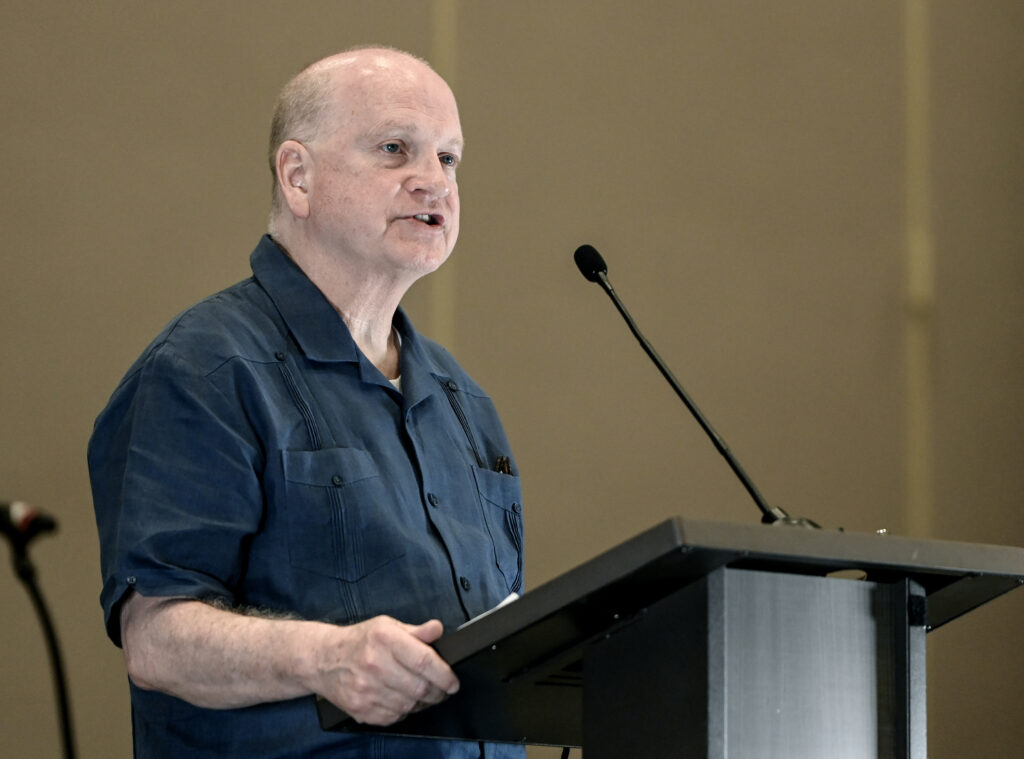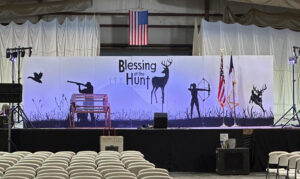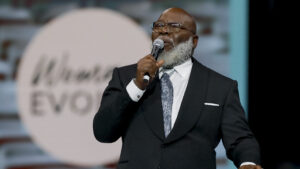
NEW ORLEANS (BP) – For the first time since the organization’s formation in 1960, the Southern Baptist Conference of Associational Leaders voted to approve a budget that allows for full-time staff during their annual meeting on June 11-12 in New Orleans.
The unanimously approved $160,000 budget includes two full-time positions. Ray Gentry, who has served as the part-time president and CEO of the organization since July 2015, will begin serving in a new full-time role next month. Gentry’s daughter, Allison, serves as the director of communications and event planner for the organization.
To help fund the growing work of the SBCAL, Gentry challenged local associations represented to consider becoming financial partners. During the conference, associational leaders pledged more than $38,000 in additional giving toward those ends.
The SBCAL is a professional organization of Southern Baptist associational leaders. The conference is held annually on the two days prior to the SBC annual meeting. Although registration has not been officially tabulated, more than 400 associational leaders, spouses, and guests registered for the Sunday lunch, a 44 percent increase over last year’s attendance.

“I hope after this conference we will be encouraged and inspired to continue to be the stabilizing and mobilizing influence, even more effectively than we have been in the past,” Gentry said.
In Gentry’s report to the association, he outlined four priorities for his expanded, now full-time role: leadership equipping, succession planning, associational candidacy and development pathways.
Related to this equipping role, Gentry highlighted a Midwest regional conference for the SBCAL in Springfield, Ill., in April that he described as a success in helping to equip associational leaders. He also announced plans for a later regional conference in the West.
Noting the need to provide professional development for associational leaders, Gentry described a partnership with Church Multiplication Ministries to provide Gospel coaching for a discounted rate.
Gentry also announced an effort starting in the fall to launch cohorts, where associational leaders will meet regularly for an hour of encouragement, equipping, and the sharing of resources.
Besides approving the budget, the SBCAL elected a new slate of leaders, including the following officers: Chair Todd Robertson (Kentucky); Vice Chair David Bowman (Texas); and Recording SecretaryJames Risner (Ohio).
New members of the SBCAL executive team, include David Bowman (Texas); Jerry Conner (Kansas); Travis Kerns (South Carolina); Brian Nall (Florida); `and Steve Schenewerk (Oregon).
Besides the short business meeting, SBCAL annual meeting attendees heard several meal and plenary speakers.
Associational leaders hear from abuse survivor, get preview of ARITF recommendations
Members of the SBC Abuse Reform Implementation Task Force (ARITF) briefed associational leaders and answered questions about the report, the recommendations they will present on Tuesday and their implications for associational leaders.
Gentry told meeting attendees the ARITF had clarified early on its desire to get input from associational leaders as they prepared their recommendations. SBCAL helped coordinate a Zoom call where associational leaders provided input.
Associational leaders heard the testimony of task force member Brad Eubank, a sexual abuse survivor and the pastor of Petal First Baptist Church of Petal, Miss. Abused as a child, Eubank described his long process of healing and his commitment to helping Southern Baptists make their churches safer.
Jon Nelson, another member of the ARITF and the pastor of Somma Community Church in Jefferson City, Mo., described to associational leaders a number of actions they believe every church can do to make their churches safer. These actions include adopting a screening process for volunteers, having a written plan to report allegations to the church family and community, and a process to care for survivors.
The task force website, which will be launched on Tuesday, will include a selection of tools and resources related to each of these areas. Nelson asked associational leaders to play a proactive role in helping churches use these resources.
“We want to identify those resources for you and put them in a place you know where to get them, so you can use them to help churches under your care to be a blessing and glorify God,” Nelson said.
Nelson said the task force plans, if it is approved for another year, to continue to add resources to the toolbox as they can.
JJ Washington stresses the power of God unto Salvation
During lunch on Sunday, JJ Washington, the North American Mission Board’s director of personal evangelism, preached from 1 Corinthians 1:18-25 as an encouragement to the associational leaders on personal evangelism.
“I can’t wrap my mind around why God wants to use me in this process, but God has called us to be a co-laborer with him in making known this Good News,” Washington said.
He noted how Jesus has power that no philosophical system can have – the power to change man on the inside.
Washington said: “Can someone here testify that He can take a thief and make him a giver, a drunk and make him sober, an addict and make him a preacher, a hater and make him a lover, the rude and make him kind? [Jesus] is the power of God.”
Leveraging Gospel coaching
Tom Wood, the president of Church Multiplication Services, spoke to the associational missionaries about the potential of Gospel coaching.
Wood noted that the last few years have been tough on pastors and their families. Citing statistics from Barna Research and Lifeway Research, he described how many pastors are serving with a sense of exhaustion.
Wood then encouraged associational leaders to provide coaching that leans into the Gospel.
“Gospel coaching is not consulting,” Wood said. “It’s not counseling. It’s not mentoring. It aims for the heart. It combines the integrity of the heart with skill. It’s an intentional, prayer-infused Gospel conversation with focused discussions on leaders’ relational, personal, missional, and spiritual life, leading to clear objectives and appropriate strategies to fulfill their God-given mission.”
Dilbeck: Helping pastors talk about compensation
Hance Dilbeck, president of GuideStone Financial Services, asked associational partners to partner with the SBC entity to help pastors talk about their compensation.
“Our mission is to enhance the financial security and resilience of those who serve Christ,” Dilbeck said. “We believe that one of the keys to answer the financial security and resilience of those pastors you serve is to help them as an advocate when it comes to their compensation. We can help you help your churches and your pastors talk about their compensation.”
Speaking from Philippians 4, Dilbeck outlined three keys for pastors when talking to their congregations about money: be careful, be confident, and make disciples.
“When we allow church to be unchallenged, to shirk their biblical responsibility for the pastor, we are hindering the development of the people of God,” Dilbeck said. “Learning to pay the preacher is part of growing up as disciples and as a church.”
Dilbeck noted that not every church will be able to pay their pastor a full-time salary, but they can all pay him fairly.
Learning to ‘Lead from the Middle’
Josh Ellis, the executive director of the Union Baptist Association in Houston, taught about leading from the middle.
Ellis said he began studying the topic when he realized that even outside of ministry situations, leadership as a concept needed to be easier to understand. Everyone, he says, can learn to be a better leader.
Ellis described three types of people in churches and associations — those in the front of the pack, those in the middle, and those in the back. Those in the front are the ones who catch the vision and rush ahead to fulfill it. Those in the back do not have a sense of urgency toward the mission. They are resistant to leadership, either because they’re healing, resting, or convinced there is a need not to go so quickly. The largest group is usually people in the middle of those two groups.
Ellis urged associational leaders not to think of these groups as static. Often people will move back and forth between them, depending upon the task.
Ellis then laid out a number of strategies for mobilizing people in each of these stages. Each stage, he says, needs contextualized care.
“Your goal as a leader is not to move everyone to the front group,” Ellis said. “You can’t ever lead only runners. But if you’re leading most of the people that are in the middle, and you’re spending time with people in the back, and you’ve got some runners and some scouts, then you’re leading the majority of your people, and that’s the most you’re ever going to be able to ask from yourself as a leader.”
Akin: ‘Keep encouraging pastors’
Preaching from 1 Peter 5:1:4, Southeastern Baptist Theological Seminary President Danny Akin told associational leaders to continue to encourage pastors in their association.
Akin noted how Peter didn’t focus on his own apostleship but addressed leaders in 1 Peter 5:1 as fellow elders.
“[Peter] comes right alongside his fellow elders, puts his arm around them and says, ‘I want to exhort you. I want to encourage you as you suffer while doing good,’” Akin said.
Akin urged associational leaders to be that kind of leader to pastors in their associations, particularly to pastors who may resist their encouragement.
“Try the best you can to reach out,” Akin said. “Love them. Serve them. Give them counsel. Let them know that you’re in their corner and that you have their back. Some of them will stay faithful because of that word of encouragement, that email you sent, that text message you drop off, that time you just show up and do nothing more than tell them you love them and want to pray for them.”
Besides listening to the plenary speakers, associational leaders took part in a number of breakout sessions on specific areas of ministry, including the 17 ministry proficiencies of an associational missions strategist, mobilizing Gen Z, and pastoral search committees.
Next year’s SBCAL meeting will take place in Indianapolis in the days preceding the SBC annual meeting.














